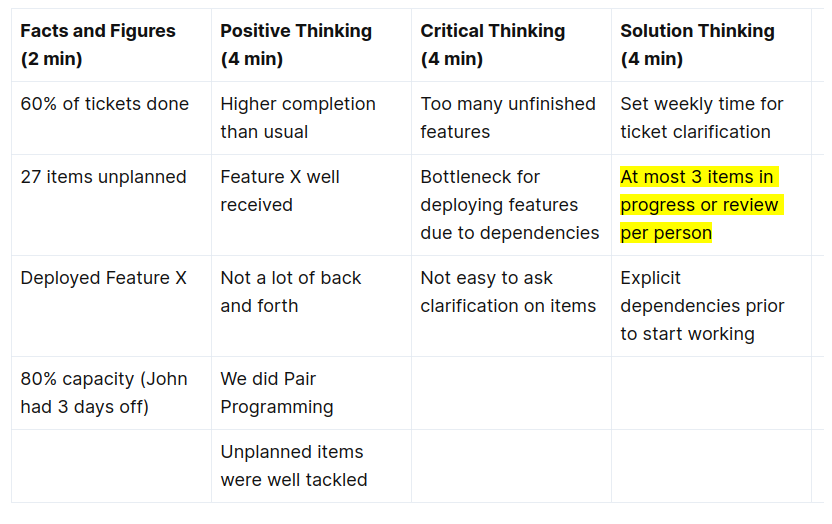Retrospectives
 Pablo Curell Mompo
Pablo Curell Mompo
If I had to choose one thing and one thing only that I would enshrine as THE thing to make a software development team more effective, it would be frequent retrospectives.
We have been doing a retrospective every two weeks at Recovr, and this is what is working great for us:
Structured and Timed
We are using a variant of the 6 thinking hats.
We spend 2 minutes on facts and figures, 4 minutes on positive thinking, 4 minutes on critical thinking and 4 minutes on solution thinking. We then leave ourselves some time to decide on at most 1 adjustment to make until the next retrospective.
We have a time keeper and a person writing everyone's points on a whiteboard.
This is how a typical retro might look in the end:

Thanks to that structure, our retrospectives are usually between 30 and 45 minutes long.
One adjustment in isolation
The idea is not to change the whole way we work at every retrospective, but rather to make at most one adjustment per retrospective.
For example we realized we had too many items ongoing, so we added a rule that anyone could only have a maximum of three items in review or in progress.
We also decided to try our hand at Ensemble Programming after a retrospective.
No listing of what was done
We do not go through each item of the period, what was done and not done. We found that it rarely leads to insights, and the few insights are not really actionable.
As such we speak about the period as a whole.
Don't debate what goes to the board
If a person of the team feels something is worth saying, it goes to the board without discussion, there can be an explanation, but doubt is not cast on it.
The place to debate the different things is when we look for the adjustment that should be made for the next period.
This allows us to not get bogged down in the particulars and react to the more general patterns emerging.
High buy in
The structure, and the fact that in the end an adjustment is decided as a group, provoques a high buy in from the whole team in the adjustment to be made for the next period.
Conclusion
Try your hand at doing frequent retrospectives today, keep them structured, keep them short and have he discipline to only make one adjustment.
Bit by bit it will improve how you work, and will find what works for your team at each moment in time.
Subscribe to my newsletter
Read articles from Pablo Curell Mompo directly inside your inbox. Subscribe to the newsletter, and don't miss out.
Written by
